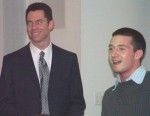LGBTQ Alumni Speaker Series Presents: Mike Emery

Former Colgate graduate Mike Emery presented a lecture to the Colgate Rainbow Alliance regarding LGBTQ issues in the country and on campus on Wednesday. Emery focused on affirming LGBTQ equality in a society with high “moral absolutism,” or within communities that hold traditional values, mainly religious ones, at an elevated level. Emery humorously began the lecture by providing “evidence” on how homosexual activists use the cartoon Spongebob Squarepants to indoctrinate young children. Next, Emery discussed his observations on gay civil unions, an issue that became very divisive in the 2004 election. He noted that approximately 12 countries were ahead of the US in that they had legalized gay civil or were progressing towards it. Presenting a World Values Survey conducted 20 years ago that presented a graph of countries around the world, Emery compared the degree of self-expression allowed in the country and its traditional, or religious, values. Emery also observed that the recent election reinforced the traditional values of the US, which were higher in comparison to the countries which had legalized gay civil unions or marriage, and that moral absolutism had increased from 37 percent to 49 percent in the past 20 years. After presenting some observations and studies, Emery related the growth of moral absolutism to the Colgate LGBTQ community. “Our culture is exacerbating the struggle of Colgate students who may be questioning their sexual identities,” Emery said. Emery also pointed out that while the LGBTQ community in the US was currently attempting to achieve gay equality through legislation, the LGBTQ community at Colgate was searching to achieve gay identity through experiences on and off campus. Emery introduced potential solutions for advancing LGBTQ interests, including appropriate risk taking, interpersonal and leadership skills and networking, similar to advice given in the business world. Emery talked about his own coming out at a large pharmaceutical company and a market research consulting firm. Emery said that he was glad he had done it. “I could only be me” and he acknowledging that his coming out had established greater credibility at work. “[In the business community, and elsewhere,] being believable is more important than being liked,” Emory said. A first-year student attending the lecture commented, “I was surprised at how methodical and business-like Emery was at presenting the information. One would expect a topic of this nature to be charged with emotion. I was a little disappointed with the low turn-out I saw at the meeting–it speaks little for how diverse or open and concerned with diversity of this kind our campus is, and it partially explains why students may be hesitant about coming out in such an environment. I think that this is an important issue that we as Colgate students need to actively engage. To me, it is a matter of human rights and discrimination. Nevertheless, I was fairly impressed by the level of intellect attained during the discussion by those who did attend.”
“It was great to have an out, gay alum speak to students about his life and experiences because he is living proof that gay people do exist at Colgate and can be successful after Colgate,” co-chair of Advocates, Ian Maron-Kolitch, said. “It was also interesting to hear his perspectives on the affect of the Colgate community on the identity of an LGBTQ student. He raised issues and asked questions we should ponder: Is this campus safe for people of different sexual orientations and gender identities? Does our behavior, passive or active, affect the level of comfort of LGBTQ people on our campus? It takes a lot of energy to stay in the closet, always looking over your shoulder thinking, ‘Does she know I’m gay? Does he?’ Imagine what closeted people in this community could contribute to the talks of ‘diversity’ if they were given the opportunity to be comfortable in their own skins.”
Overall, Emery’s lecture provided insight on current LGBTQ issues, tying together the community’s difficulties gaining equality on a national level and the struggle of Colgate students searching for their own identities in a divisive environment.






